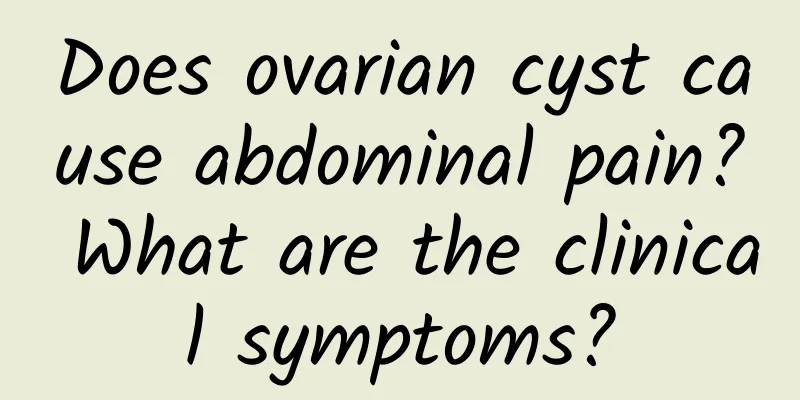Does ovarian cyst cause abdominal pain? What are the clinical symptoms?

|
Will ovarian cysts cause abdominal pain? What are the clinical symptoms? Clinically, ovarian cysts often present with lower abdominal pain, lower abdominal discomfort, increased vaginal discharge, yellow vaginal discharge, abnormal vaginal odor, irregular menstruation, and usually a firm and painless mass in the lower abdomen. Sometimes sexual intercourse can be painful. When the cyst affects hormone production, symptoms such as irregular vaginal bleeding or increased hair growth may occur. If the cyst is twisted, there will be severe abdominal pain, dyspnea, decreased appetite, nausea, and fever. Larger cysts can compress the area near the bladder, causing frequent urination and difficulty urinating. The main clinical symptoms of ovarian cysts are: ① Menstrual disorders: mainly amenorrhea, most of which are secondary amenorrhea. Before amenorrhea, there is often infrequent or too little menstruation, and occasionally frequent or too much menstruation. ② Infertility: Infertility is often caused by menstrual disorders and anovulation. Menstrual disorders and infertility are often the main reasons for medical treatment. ③ Hirsutism and obesity: Due to excessive secretion of androgen in the body, hirsutism and obesity may occur. The hair distribution tends to be masculine. The hirsutism phenomenon is often not noticed by patients and is only discovered during physical examination. ④ Bilateral ovarian enlargement: In a few patients, gynecological examination may reveal that the ovaries are 1 to 3 times larger than normal and have a firm feel. In most patients, enlarged ovaries need to be discovered through auxiliary examinations such as B-ultrasound, which are not easily detected by clinical examinations. ⑤ Lower abdominal discomfort: Lower abdominal discomfort is the initial symptom before the patient touches the lower abdominal mass. Due to the weight of the tumor itself and the influence of intestinal peristalsis and changes in body position, the tumor moves in the pelvic cavity, involving its pedicle and pelvic funnel ligament, causing the patient to have a feeling of distension and heaviness in the lower abdomen or iliac fossa. ⑥ Compression symptoms: Huge ovarian tumors can cause dyspnea and palpitations due to compression of the diaphragm. Ovarian tumors combined with a large amount of ascites can also cause ovarian cysts blocking the birth canal and cause such symptoms; but some ovarian tumor patients' dyspnea is caused by unilateral or bilateral pleural effusion. |
<<: What is the cause of uterine dysmenorrhea
>>: How to regulate irregular menstruation
Recommend
Eat salad to cool down? Beware of sauce mines! Nutritionist teaches you how to eat right
In the hot summer, what should I eat when I have ...
What are the methods of Western medicine for treating pelvic peritonitis?
Pelvic peritonitis is a common disease that often...
What should you pay attention to when you have habitual miscarriage? There are 4 aspects
Nowadays, women are under pressure from many aspe...
How to effectively prevent endometriosis
Endometriosis is a disease known as a devil. Mens...
How do you know the cause of pelvic inflammatory disease?
The cause of pelvic inflammatory disease may be r...
What are the symptoms of threatened abortion? Is it serious? How to treat it?
Threatened abortion can be treated with bed rest,...
Adnexitis can accelerate the loss of beauty
Ms. He has a well-proportioned figure, fair skin,...
How big are multiple uterine fibroids before they need treatment? Are multiple uterine fibroids benign tumors?
Uterine fibroids are benign tumors and one of the...
Will abortion lead to infertility? Why does abortion lead to infertility?
Whether or not an abortion will lead to infertili...
What are the main examination items for ovarian cysts
What are the main examination items for ovarian c...
What are the main harmful manifestations of cervical hypertrophy?
Gynecological diseases are very harmful to women,...
Break through the weight loss wall! 4 tips to prevent stagnation and increase muscle endurance through weight training
Eating less and exercising more are the only ways...
Early symptoms of vaginitis
Vaginitis causes great psychological pressure on ...
Can I get pregnant if I have chronic cervicitis and cervical hypertrophy?
Cervical hypertrophy caused by chronic cervicitis...
Northern dumplings are high in calories, how to eat them to be nutritious and slim
[Key Points]: Dumplings are high in calories. The...









